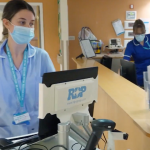The origin of the black church is often debated, but one thing is certain – it was the arrival of the Windrush generation that prompted its growth in England.
And while mainstream churches are in decline, black majority churches are thriving.
The New Testament Assembly in Tooting, south London, is one of these churches.
It was founded out of frustration in 1961, by Bishops Melvin Powell and Donald Bernard, after many in the Windrush generation found themselves facing rejection from existing churches in England.
“My father would tell me stories, horrible stories of the kinds of rejection and the negative experience that they had when they arrived,” says Bishop Delroy Powell, who now leads the church.
“They were told that their presence was making the worshipers uncomfortable, and they were advised to not come back, which forced many of them to start their own house of worship.”
These “houses of worship” were often just that. People gathered together anywhere they could to worship God – in living rooms, shop fronts or community centres.
COVID-19: Top NHS doctor calls on those without booster to come forward for third vaccine
COVID-19: New restrictions come into force in Wales, Scotland and Northern Ireland
Hundreds of ‘dangerous’ dogs killed after being seized by police – but fears many ‘needlessly euthanised’
“You could say that a lot of the black churches that began in the ’60s were a result of the racism that they experienced,” says Bishop Powell.
For many of this generation, the black church was the only space they could call their own, and became a cultural hub where they could support each other spiritually, emotionally and sometimes financially.
Bishop Powell explains that when “they couldn’t afford to buy a property, they would pull their funds together and raise enough for a deposit.
“Then they would share these properties until the next person was able to independently move out.”
Sixty years and 12 churches later, the New Testament Assembly continues to serve its community.
It is a hub for anyone experiencing hardship, working alongside the local authority to provide mental health support, as well as helping those with immigration or housing issues. And, in recent years, tackling youth violence.
Assistant pastor Andrew Wignal says: “Sadly, for me over the last few years, there have been quite a few funerals I’ve had to conduct of young people and victims of knife and gun crime.
“Normally the place is flooded with young people, you know, their friends who don’t know how to channel that horrendous grief.”
He says the church offers these families a “safe space and safe haven” to support them in their journey and ensure they do not feel alone.
This is a sentiment that the pastor says is crucial to the Christmas season.
Follow the Daily podcast on Apple Podcasts, Google Podcasts, Spotify, Spreaker
The church also runs a nearby community centre, which works with elderly members of the congregation who may be alone, providing hundreds of Christmas hampers to those in need.
Their doors are “open for everyone”, the pastor says.
People can expect carols by candlelight as well as Christmas carols “with a Caribbean twist”.
This time of year is an opportunity, he says, to “thank God for bringing us through what has been a difficult year for many for all of us, whilst remaining grateful to God that we are crossing over into 2022”.






















